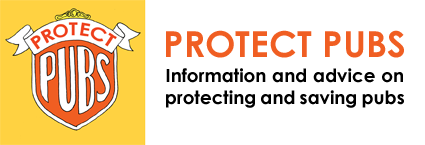Why do pubs close? We’ve heard lots of stories: some true, some not. Here’s a myth-busting guide to help you navigate the fiction and the excuses…
“It wouldn’t have closed if anybody used it”
In our experience, this is very rarely the case. The majority of pubs that close, especially in urban and suburban areas, do not close due to lack of custom. In many cases there remains widespread support for the pub from its community; pubs often close due to the nature of their ownership. Half the country’s pub stock is owned by Pubcos: these companies have huge debts and often accept inflated offers for pub buildings from developers planning to turn them into housing.
Whilst there are undoubtedly some pubs which struggle with lack of demand, particularly in rural areas where transport and access may be an issue, the total volume of pub stock is 75% of what it was 30 years ago and many English villages are now left with one or no pubs. It’s a common misconception that pubs are sold or closed due to lack of trade. Pubs are inherently low margin businesses, but they make money. They close when the freeholder is made a better short-term offer!
“The pub game’s dead”
Pubs, in the form that we recognise them today, have existed for at least 200 years and their origins can be traced back to the beer houses, taverns and coaching inns that existed in England over the last 400 years. The pub sector cannot afford to stand still. It needs to continually evolve to cater for a changing market but it’s far from dead.
Well-managed pubs, responding to the needs of the community and its visitors, have proven very successful. It is acknowledged that supermarkets exploit tax rules to undercut pub prices, but pubs need to play to their strength and remind customers that they offer something that a supermarket cannot. They offer a shared space for social interaction in a supervised and atmospheric environment. The chink of glasses amongst a group of friends when the first round is purchased in a pub has a robustness which cannot be matched at home or with beers in the park. The pub game isn’t dead, it’s just experiencing a challenging period of soul-searching.
“It was never a good pub anyway”
Everyone has their own ideas about what constitutes a ‘good’ and ‘bad’ pub. The pub as a construct is sound, and well-proven. Under poor management, any hospitality-based business can deteriorate and disenfranchise customers. There could be a variety of reasons why a pub is perceived to have gone “downhill”. Pubcos (freeholders of 50% of pubs) restrict the choice of beer available to tenants and this is sold at above market prices. If an owner is looking to achieve permission for a change of use, it is in his or her interests to present the business to decision-makers as ‘failing’. We are aware of many cases of pubs being deliberately run into the ground.
The crucial point is that past performance should have no bearing on future potential. In the right pair of hands, with a caring and motivated publican, previously unpopular pubs can and indeed have been dramatically transformed. A poor pub often just needs a new landlord with enthusiasm and fresh ideas. The answer is to let somebody else see if they can make a go of it, not to sacrifice it for housing or shops. The pub is bigger than its present publican.
“There’s another pub round the corner, why should I care about this one?”
That argument holds some water (just) until they’ve all gone. Then you may find yourself driving or catching a bus quite some distance to your ‘local’. Every pub has its unique character and offer, based around its history, layout, location and the aspirations of the publican. The one round the corner may not serve food, may not open during the week, may not stock a particular kind of beer or wine, and may not welcome children. In any marketplace there needs to be variety and choice. This is good for pub-goers and stimulates healthy competition. The pub market is normally big enough to justify a variety and spread of style. And without a healthy range of pubs, what would become of that other great tradition: the pub crawl?!?
“The owner can do what they want; it’s their property”
This statement is only valid to a certain extent. The planning system was nationalised in 1947 to bring a degree of control to development and to protect the social amenity of our neighbourhoods from the potential harmful effects of a free and unrestricted market. It would be inappropriate, for example, for a land-owner to establish a new airport in a densely-populated area, or an industrial incinerator on a housing estate and the planning system prevents this. When an owner no longer wants a pub, they can, of course, sell it to somebody else, but without permission it will not be lawful to demolish it or convert it into alternative use e.g. housing. Local people may depend on that pub for their day-to-day needs and this will be a factor in the Council determining any planning proposal for a change of use or demolition. The planning system cannot force an owner to run a pub (it could be left empty) or determine the style of pub it will be, but it can (usefully) restrict the use of the land to that of a pub. In most cases, natural market forces will do the rest!

